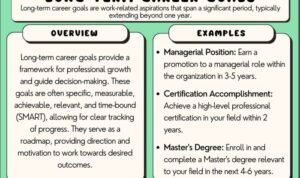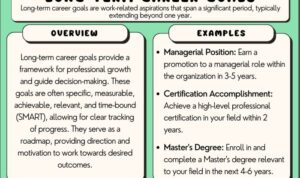Career Advancement Tips: Embark on a journey towards professional success with these essential tips that will elevate your career to new heights. From setting clear goals to developing in-demand skills, this guide covers all you need to know to thrive in your professional endeavors.
Importance of Career Advancement

Career advancement is crucial for professional growth as it opens up opportunities for individuals to enhance their skills, take on more challenging roles, and increase their earning potential. It allows individuals to progress in their careers, gain recognition for their hard work, and achieve personal fulfillment.
Increased Job Satisfaction and Fulfillment
Advancing in one’s career often leads to increased job satisfaction and fulfillment as individuals are able to pursue their passions, work on projects they are passionate about, and feel a sense of accomplishment in their work. This can result in higher motivation, productivity, and overall happiness in the workplace.
Positive Impact on Life and Financial Stability
Career advancement can positively impact one’s life by providing a sense of security, stability, and growth. As individuals move up the career ladder, they may have access to better benefits, higher salaries, and improved work-life balance. This can lead to a better quality of life, increased financial stability, and the ability to pursue personal goals and aspirations.
Setting Clear Career Goals
Setting clear career goals is crucial for success in your professional journey. By having specific and achievable goals, you can stay focused, motivated, and track your progress effectively. It also helps in making informed decisions and planning your career path strategically.
Strategies for Setting Specific and Achievable Career Goals
- Identify your strengths, weaknesses, interests, and values to determine what you want to achieve in your career.
- Set SMART goals – Specific, Measurable, Achievable, Relevant, and Time-bound to ensure clarity and accountability.
- Break down your long-term career goals into smaller, manageable short-term objectives to make them more attainable.
- Seek feedback from mentors, peers, or career counselors to gain different perspectives and refine your goals.
Aligning Career Goals with Personal Values and Interests
- Reflect on your personal values, passions, and interests to ensure that your career goals are aligned with what truly matters to you.
- Consider how your goals contribute to your overall sense of fulfillment and happiness in both your professional and personal life.
- Choose a career path that resonates with your values and interests to stay motivated and engaged in your work.
Breaking Down Long-term Career Goals into Manageable Short-term Objectives, Career Advancement Tips
- Create a timeline with specific milestones to track your progress towards your long-term career goals.
- Set achievable short-term objectives that contribute to the accomplishment of your larger goals.
- Regularly review and adjust your short-term objectives based on feedback and changing circumstances to stay on course.
- Celebrate small wins along the way to stay motivated and inspired to continue working towards your long-term aspirations.
Skill Development for Career Growth

In today’s competitive job market, continuous learning and skill development play a crucial role in advancing one’s career. Employers value employees who are proactive in enhancing their skills and staying updated with the latest industry trends and technologies. By investing in skill development, individuals can position themselves for career growth and success.
In-Demand Skills for Career Growth
- Data Analysis: With the increasing reliance on data-driven decision-making, proficiency in data analysis tools such as Excel, Tableau, or Python can open up opportunities in various industries.
- Digital Marketing: In the age of digitalization, skills in digital marketing, including , social media marketing, and email marketing, are highly sought after by companies looking to expand their online presence.
- Project Management: Strong project management skills, including the ability to lead teams, manage budgets, and meet deadlines, are valuable in many industries and can lead to career advancement.
Staying Updated with Industry Trends
It is essential to stay abreast of industry trends and technologies to remain competitive in the job market and advance in one’s career. By attending workshops, conferences, and online courses, individuals can gain insights into emerging trends and acquire new skills to stay relevant in their field.
Building a Professional Network: Career Advancement Tips
Building a strong professional network is essential for career advancement in today’s competitive job market. Networking can open doors to new opportunities, provide valuable insights, and connect you with mentors who can guide you on your career path.
Tips for Building and Expanding Your Network:
- Attend industry conferences and events to meet professionals in your field.
- Join professional networking platforms like LinkedIn to connect with industry leaders and peers.
- Participate in online forums and discussions related to your industry to showcase your expertise.
- Volunteer for industry associations or charitable organizations to expand your network while giving back to the community.
- Set up informational interviews with professionals you admire to learn more about their career journey.
Benefits of Networking:
- Access to hidden job opportunities that are not advertised publicly.
- Opportunities for mentorship and guidance from experienced professionals.
- Increased visibility within your industry, leading to potential collaborations and partnerships.
- Knowledge sharing and learning from others’ experiences to enhance your own career growth.
Effective Platforms and Events for Networking:
- LinkedIn: Create a strong profile, join relevant groups, and engage with industry professionals through posts and comments.
- Industry Conferences: Attend conferences and workshops to meet professionals face-to-face and build meaningful connections.
- Local Meetup Groups: Join local networking groups or events to connect with professionals in your area.
- Alumni Associations: Stay connected with your alma mater’s alumni network for opportunities to network with fellow graduates.
Work-Life Balance
Maintaining a healthy work-life balance is crucial for long-term career success. It involves managing work responsibilities while prioritizing personal well-being. A good work-life balance can positively impact career advancement by reducing stress, increasing productivity, and overall job satisfaction.
Strategies for Work-Life Balance
- Set boundaries: Clearly define work hours and personal time to avoid burnout.
- Take breaks: Regular breaks throughout the day can help improve focus and productivity.
- Prioritize tasks: Focus on important tasks first to avoid feeling overwhelmed.
- Delegate when possible: Don’t be afraid to ask for help or delegate tasks to others.
- Practice self-care: Make time for activities that promote relaxation and well-being, such as exercise, hobbies, or spending time with loved ones.
Benefits of a Good Work-Life Balance
- Improved mental health: Balancing work and personal life can reduce stress and anxiety.
- Higher job satisfaction: Employees who have a good work-life balance are generally happier in their roles.
- Increased productivity: When employees feel balanced, they are more focused and efficient at work.
- Better relationships: Spending time with family and friends can strengthen personal relationships and overall happiness.












